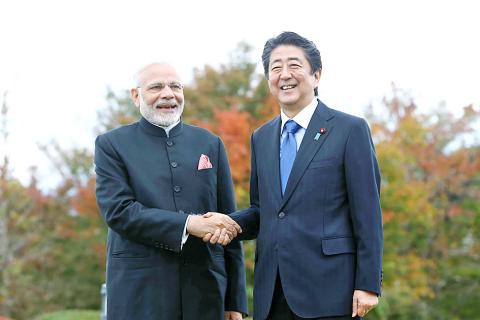The leaders of Japan and India are reaffirming their ties amid growing worries about trade and regional stability.
Indian Prime Minister Narendra Modi, who arrived in Japan on Saturday, yesterday met Japanese Prime Minister Shinzo Abe at a resort area near Mount Fuji.
Modi also visited a nearby plant owned by major Japanese robot maker Fanuc Corp.

Photo: AFP
Relations with China are a major issue shared by Modi and Abe, as their cooperation might balance China’s growing regional influence and military assertiveness.
“The India-Japan partnership has been fundamentally transformed and it has been strengthened as a special strategic and global partnership,” Modi told Kyodo news agency. “There are no negatives, but only opportunities in this relationship, which are waiting to be seized.”
Modi chose Japan among the first nations to visit after taking power four years ago.
He has been urging countries in the Indo-Pacific region to unite against protectionism and cross-border tensions.
In another sign of closer relations, India and Japan are to hold their first joint military exercises involving ground forces, starting next month.
Abe has just returned from China, where he met Chinese President Xi Jinping (習近平) and agreed that the two nations were “sharing more common interests and concerns.”
US President Donald Trump’s policies, which have targeted mostly China with tariffs, but also Japan and other nations, accusing them of unfair trade practices, are working to prod India and Japan to promote their economic ties.
The Japanese Ministry of Foreign Affairs said the leaders had lunch at a hotel in Yamanashi Prefecture, west of Tokyo, and exchanged a wide range of views on pursuing “a free and open” Indo-Pacific region.
Abe told Modi about his trip to China and both sides agreed on the need to cooperate closely on getting North Korea to drop nuclear weapons development, the ministry said in a statement.
Japan’s investment in India still has room to grow. The country is helping India build a super-fast railway system.
Abe has made bolstering and opening the nation’s economy central to his policies, called “Abenomics,” and has encouraged trade, foreign investment and tourism.
Although Japan has long seen the US as its main ally, especially in defense, Abe is courting other ties.
He has also been vocal about free trade, which runs counter to Trump’s moves to raise tariffs.
Earlier this year, Japan signed a landmark deal with the EU that will eliminate nearly all tariffs on products they trade.
European and Japanese leaders pledged to strengthen their partnership in defense, climate change and human exchanges, to send what they called a clear message against protectionism.
Abe and Modi are to hold a more formal summit today in Tokyo.

CHAOS: Iranians took to the streets playing celebratory music after reports of Khamenei’s death on Saturday, while mourners also gathered in Tehran yesterday Iranian Supreme Leader Ayatollah Ali Khamenei was killed in a major attack on Iran launched by Israel and the US, throwing the future of the Islamic republic into doubt and raising the risk of regional instability. Iranian state television and the state-run IRNA news agency announced the 86-year-old’s death early yesterday. US President Donald Trump said it gave Iranians their “greatest chance” to “take back” their country. The announcements came after a joint US and Israeli aerial bombardment that targeted Iranian military and governmental sites. Trump said the “heavy and pinpoint bombing” would continue through the week or as long

TRUST: The KMT said it respected the US’ timing and considerations, and hoped it would continue to honor its commitments to helping Taiwan bolster its defenses and deterrence US President Donald Trump is delaying a multibillion-dollar arms sale to Taiwan to ensure his visit to Beijing is successful, a New York Times report said. The weapons sales package has stalled in the US Department of State, the report said, citing US officials it did not identify. The White House has told agencies not to push forward ahead of Trump’s meeting with Chinese President Xi Jinping (習近平), it said. The two last month held a phone call to discuss trade and geopolitical flashpoints ahead of the summit. Xi raised the Taiwan issue and urged the US to handle arms sales to

State-run CPC Corp, Taiwan (CPC, 台灣中油) yesterday said that it had confirmed on Saturday night with its liquefied natural gas (LNG) and crude oil suppliers that shipments are proceeding as scheduled and that domestic supplies remain unaffected. The CPC yesterday announced the gasoline and diesel prices will rise by NT$0.2 and NT$0.4 per liter, respectively, starting Monday, citing Middle East tensions and blizzards in the eastern United States. CPC also iterated it has been reducing the proportion of crude oil imports from the Middle East and diversifying its supply sources in the past few years in response to geopolitical risks, expanding

OTHER OPTIONS: Given possible US intervention and Taiwanese counterattacks, China might opt to blockade Taiwan or take its outlying islands instead of an all-out invasion A US think tank has urged Taiwan to adopt a “hellscape” strategy that would flood the Taiwan Strait with drones and other uncrewed systems to deter invasion by China. In its report, Hellscape for Taiwan, published on Thursday, the Center for a New American Security said Taipei’s asymmetric defense approach — often described as a “porcupine strategy” — needs to evolve to keep pace with the growing capabilities of the Chinese People’s Liberation Army. The “hellscape” strategy involves saturating the air and waters around Taiwan with thousands of drones and other platforms capable of striking invading forces from multiple domains at once. Long-range